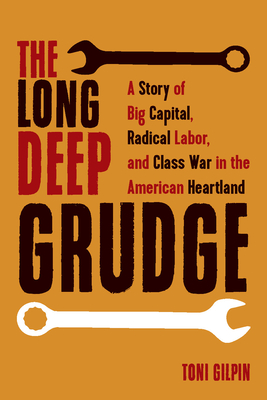The Long Deep Grudge: A Story of Big Capital, Radical Labor, and Class War in the American Heartland

The Long Deep Grudge: A Story of Big Capital, Radical Labor, and Class War in the American Heartland
Honorable Mention - Philip Taft Labor History Prize
This rich history details the bitter, deep-rooted conflict between industrial behemoth International Harvester and the uniquely radical Farm Equipment Workers union. The Long Deep Grudge makes clear that class warfare has been, and remains, integral to the American experience, providing up-close-and-personal and long-view perspectives from both sides of the battle lines.
International Harvester - and the McCormick family that largely controlled it - garnered a reputation for bare-knuckled union-busting in the 1880s, but in the 20th century also pioneered sophisticated union-avoidance techniques that have since become standard corporate practice. On the other side the militant Farm Equipment Workers union, connected to the Communist Party, mounted a vociferous challenge to the cooperative ethos that came to define the American labor movement after World War II.
This evocative account, stretching back to the nineteenth century and carried through to the present, reads like a novel. Biographical sketches of McCormick family members, union officials and rank-and-file workers are woven into the narrative, along with anarchists, jazz musicians, Wall Street financiers, civil rights crusaders, and mob lawyers. It touches on pivotal moments and movements as wide-ranging as the Haymarket "riot," the Flint sit-down strikes, the Memorial Day Massacre, the McCarthy-era anti-communist purges, and America's late 20th-century industrial decline.
Both Harvester and the FE are now gone, but this largely forgotten clash helps explain the crisis of yawning inequality now facing US workers, and provides alternative models from the past that can instruct and inspire those engaged in radical, working class struggles today.
PRP: 154.69 Lei
Acesta este Prețul Recomandat de Producător. Prețul de vânzare al produsului este afișat mai jos.
139.22Lei
139.22Lei
154.69 LeiLivrare in 2-4 saptamani
Descrierea produsului
Honorable Mention - Philip Taft Labor History Prize
This rich history details the bitter, deep-rooted conflict between industrial behemoth International Harvester and the uniquely radical Farm Equipment Workers union. The Long Deep Grudge makes clear that class warfare has been, and remains, integral to the American experience, providing up-close-and-personal and long-view perspectives from both sides of the battle lines.
International Harvester - and the McCormick family that largely controlled it - garnered a reputation for bare-knuckled union-busting in the 1880s, but in the 20th century also pioneered sophisticated union-avoidance techniques that have since become standard corporate practice. On the other side the militant Farm Equipment Workers union, connected to the Communist Party, mounted a vociferous challenge to the cooperative ethos that came to define the American labor movement after World War II.
This evocative account, stretching back to the nineteenth century and carried through to the present, reads like a novel. Biographical sketches of McCormick family members, union officials and rank-and-file workers are woven into the narrative, along with anarchists, jazz musicians, Wall Street financiers, civil rights crusaders, and mob lawyers. It touches on pivotal moments and movements as wide-ranging as the Haymarket "riot," the Flint sit-down strikes, the Memorial Day Massacre, the McCarthy-era anti-communist purges, and America's late 20th-century industrial decline.
Both Harvester and the FE are now gone, but this largely forgotten clash helps explain the crisis of yawning inequality now facing US workers, and provides alternative models from the past that can instruct and inspire those engaged in radical, working class struggles today.
Detaliile produsului













